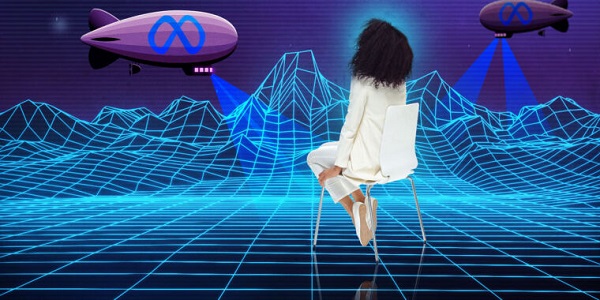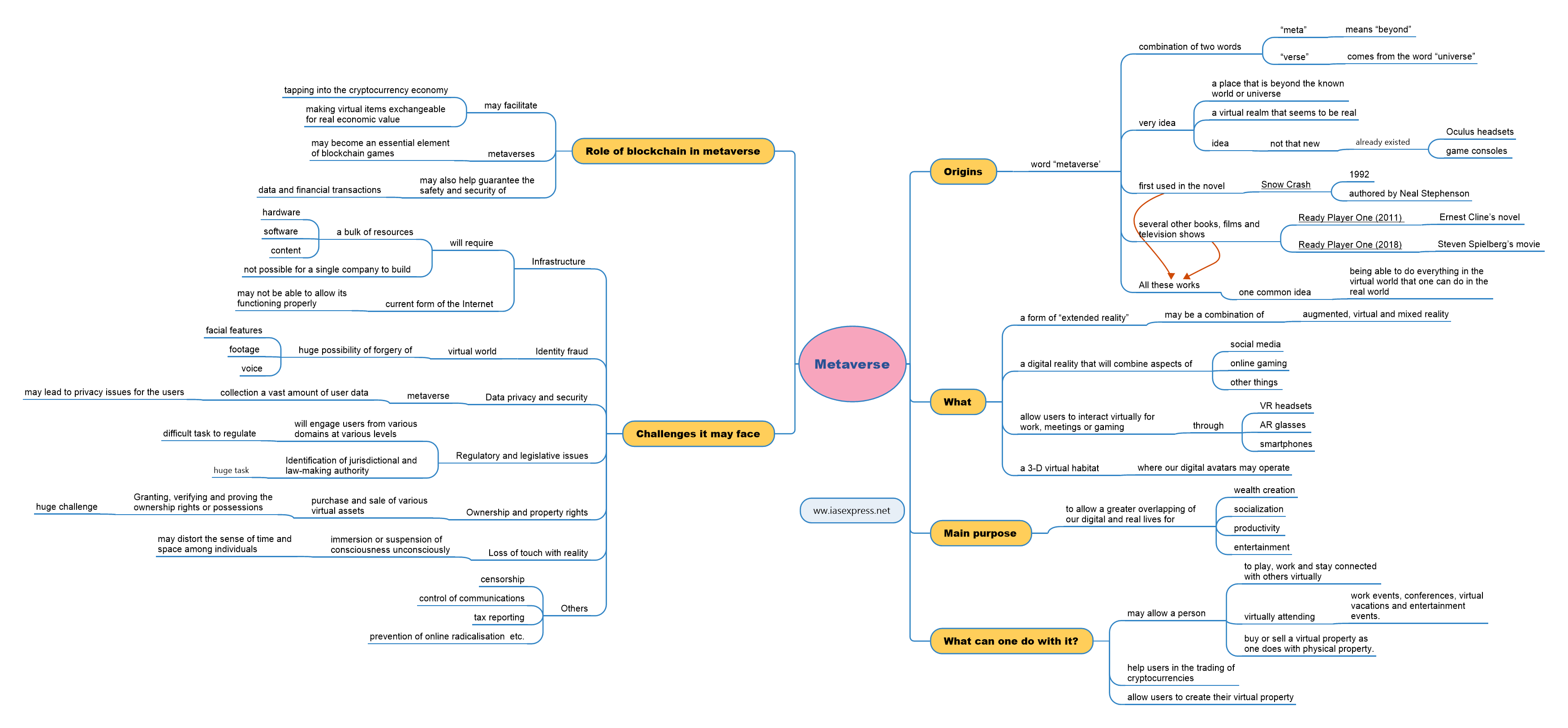Metaverse – Origins, Purpose and Challenges

Social media giant Facebook recently announced to rebrand itself as Meta and the plan to build the “metaverse”. The move comes as a major landmark in the field of technological innovation and how we interact with it. The rebranding of the company shows how it desires to go beyond the social networking platform and enter into the world of extended reality. Now, the question is what does this idea of “metaverse” stand for? Is it possible to build it? What might be the possible challenges in developing this idea into reality and so on?
This topic of “Metaverse – Origins, Purpose and Challenges” is important from the perspective of the UPSC IAS Examination, which falls under General Studies Portion.
Origins
- The word “metaverse’ is a combination of two words – “meta” which is of Greek origin means “beyond” and “verse” comes from the word “universe”. The very idea points towards a place that is beyond the known world or universe. It can be also termed as a virtual realm that seems to be real.
- The idea is not that new as we are already familiar with video games, Oculus headsets and game consoles that immerse us into virtual worlds.
- However, the term was first used in the novel Snow Crash in the year 1992 authored by Neal Stephenson. The book presents metaverse as the ultimate evolution of the Internet. The book shows how virtual interactions in virtual reality may have an impact on the real world as well.
- After the release of Snow Crash, several other books, films and television shows tried to portray this idea in their works. Ernest Cline’s novel Ready Player One (2011) and Steven Spielberg’s movie Ready Player One (2018) adapted from the same book are such prominent examples.
- All these works try to convey one common idea – “metaverse” (being able to do everything in the virtual world that one can do in the real world).
What is Metaverse?
- A Metaverse is a form of “extended reality”. This “extended reality” may be a combination of augmented, virtual and mixed reality.
- Augmented Reality (AR)
- It enhances the real physical world experience by using digital visual elements, sound, or other sensory stimuli delivered via technology.
- It uses the existing real-world environment and adds virtual information to it for enhancing the experience.
- ARs can be accessed by using a smartphone and the users can control their presence in the real world.
- Virtual Reality (VR)
- It enhances fictional worlds by using technology.
- It creates a virtual or artificial environment and immerses the users in it.
- It can be accessed by using a headset and the users are controlled by the system.
- Mixed Reality
- Introducing digital elements in the real world and merging the real world with the virtual one (Internet).
- Augmented Reality (AR)
- It will be a digital reality that will combine aspects of social media, online gaming, and other things allowing users to interact virtually for work, meetings or gaming through VR headsets, AR glasses and smartphones.
- It will be a 3-D virtual habitat where our digital avatars may operate.
What is its main purpose?
- In the time of the Covid-19 pandemic, it became essential to do everything remotely or without being physically present at a given place to do a particular work. The most obvious example of such discourse is the work from home culture. Metaverse may offer the best solution to this problem.
- In short, the main purpose of the metaverse is to allow a greater overlapping of our digital and real lives for wealth creation, socialization, productivity and entertainment.
What can one do with it?
- It may allow a person to play, work and stay connected with others virtually.
- It may involve virtually attending work events, conferences, virtual vacations and entertainment events.
- It will also allow an individual to buy or sell a virtual property as one does with physical property.
- It will help users in the trading of cryptocurrencies.
- It may also allow users to create their virtual property.
What are the challenges it may face?
- Infrastructure
- Building a metaverse will require a bulk of resources such as hardware, software and content. It will not be possible for a single company to build in and attract so many resources single-handedly.
- Additionally, the infrastructure required is not that robust at this moment. The current form of the Internet may not be able to allow its functioning properly. It will need a broader and complex set of standards and protocols than the traditional Internet.
- This will require large companies like Google, Amazon and others to come together and invest robustly to ensure cross-integration.
- Identity fraud
- Metaverse will be a virtual world almost. So, there is a huge possibility of forgery of facial features, footage and voice.
- Furthermore, it will be difficult to identify in case of forgeries whether it is an individual or a bot trying to replicate one’s existence in the virtual world.
- Data privacy and security
- For its functioning and providing the facilities metaverse promises to provide, it will collect a vast amount of user data for individual identification, advertisement, and tracking through multiple channels, like wearable devices, microphones, heart and respiratory monitors. If at any stage there is a security breach then that may lead to privacy issues for the users.
- Since many financial transactions will take place in the virtual marketplaces, maintaining the security of such transactions might be a serious issue. It will be a mammoth task to convince users to feel safe and persuade them to carry on tasks related to currency and payments on metaverse.
- Regulatory and legislative issues
- Metaverse will engage users from various domains at various levels all over the world. Therefore, it will be a difficult task to regulate it.
- Identification of jurisdictional and law-making authority will be a tough task further.
- Questions regarding the jurisdictional authority over metaverse may fuel conflicts among various nations as they may look inward to enforce their legislation.
- Ownership and property rights
- Metaverse will involve the purchase and sale of various virtual assets as well as such items which will have real-world value. Examples include digital assets and tokens. The virtual world assets or items may also represent real-world objects such as art, music, videos and much more.
- Granting, verifying and proving the ownership rights or possessions over such items will also be a huge challenge.
- Loss of touch with reality
- Since augmented, virtual and mixed reality will play an important role in the metaverse, they will require the users to immerse themselves in it. This immersion or suspension of consciousness unconsciously may distort the sense of time and space among individuals.
- People may be so immersed in virtual reality that they may lose touch with the real world.
- Others
- These include issues regarding censorship, control of communications, tax reporting, the prevention of online radicalisation and many more.
What is the role of blockchain in the metaverse?
- The use of blockchain infrastructure in metaverse may facilitate tapping into the cryptocurrency economy and making virtual items exchangeable for real economic value.
- By using engaging and immersive virtual world elements and network interactivity of social media, metaverses may become an essential element of blockchain games on the Internet.
- It may also help guarantee the safety and security of data and financial transactions taking place on metaverse.
What could be the way forward?
Metaverse is a concept full of challenges and opportunities. On one hand, it will facilitate seamless and hassle-free interactions at various levels while on the other it will have to develop secure unique verification systems for varied transactions that may take place in it. Even though we are at the beginning of this technological revolution, it will require awareness and responsible planning on the part of various stakeholders to ensure a safe and secure universe beyond this realm.
Practise Question
- Is the concept of metaverse a revolution or mere hype? Substantiate your answer with suitable arguments.
- https://www.gemini.com/cryptopedia/what-is-metaverse-crypto-nft-game-blockchain
- https://lucidrealitylabs.com/blog/7-challenges-of-the-metaverse
- https://www.weforum.org/agenda/2021/10/facebook-meta-what-is-the-metaverse/
- https://www.thehindu.com/sci-tech/technology/what-is-the-metaverse-zuckerberg-and-nadella-are-talking-about/article35744079.ece
- https://economictimes.indiatimes.com/tech/technology/what-is-the-metaverse-and-why-is-everyone-talking-about-it/articleshow/86173493.cms
- https://www.outlookindia.com/website/story/business-news-metaverse-the-rise-of-the-unique-technology-and-what-it-holds-for-future/403946
- https://www.investopedia.com/metaverse-definition-5206578
- https://www.augustman.com/sg/gear/tech/what-is-metaverse-and-how-does-it-work/
- https://www.moneycontrol.com/news/business/explainer-what-is-a-metaverse-and-why-is-everyone-talking-about-it-7322821.html
- https://www.news18.com/news/tech/explained-what-is-metaverse-and-why-facebook-meta-thinks-its-the-future-of-internet-4416881.html


